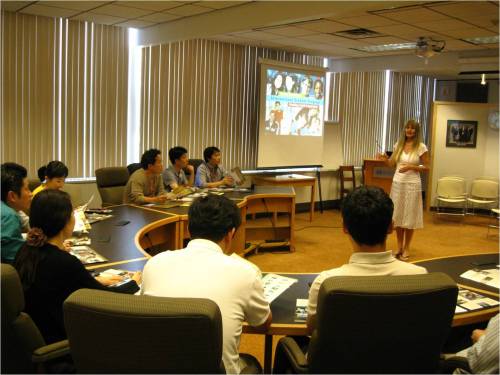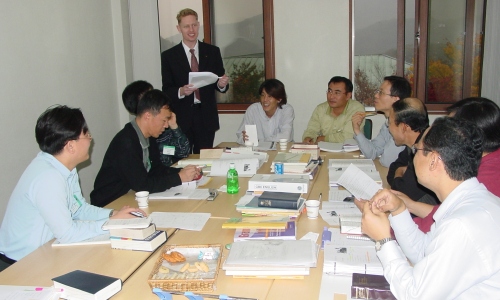Korean companies strive to foster English-speaking workforce
Kim Hyun-joo, an employee of Samsung Electronics’ marketing team, has fond memories of the 10 weeks she spent at Samsung’s foreign language institute, remembering the time as grueling but worthwhile.
“Of course I can’t say I won’t need any more English training from now ever again, I can definitely say I’m good for now,” Kim told The Korea Herald.
Currently, Kim is not on any of the English training programs that Samsung offers.
Kim is actually one of the luckier employees in Korea.
Koreans are usually pestered and pressured to learn the language ― and in some cases more than just English ― but most just can’t find the time.
Kim Hyun-joo, an employee of Samsung Electronics’ marketing team, has fond memories of the 10 weeks she spent at Samsung’s foreign language institute, remembering the time as grueling but worthwhile.
“Of course I can’t say I won’t need any more English training from now ever again, I can definitely say I’m good for now,” Kim told The Korea Herald.
Currently, Kim is not on any of the English training programs that Samsung offers.
Kim is actually one of the luckier employees in Korea.
Koreans are usually pestered and pressured to learn the language ― and in some cases more than just English ― but most just can’t find the time.

“I have tried and tried to study English and Japanese, both languages that I need to learn for my job, but between my work and dinner gatherings, I have yet to pursue either,” said Kim Jong-han, a 32-year-old worker at a publishing house.
Fortunately, an increasing number of firms understand that in order to mold “global employees,” they must be able to offer a menu of “learn-and-run” language services to choose from.
Cramming for English
The program Kim was on is famous within Samsung not only because it is so intensive, but because admission is granted only after passing orientation tests. Upon graduation, the employees also must take a test to make sure they learned everything they should, and also determine how much their English proficiency has improved.
“The tests are designed as a goal the students must strive to achieve in order to give them a stronger sense of motivation,” said Lee Kyoung-hwa, senior manager of Samsung’s Global Communications Group.
There’s a similar course at most large-sized firms including LG Group.

“These courses are not only about learning, but it’s also about how much recognition you are getting as a talented individual, meaning that the company is that much prepared to invest in you,” said Ahn Young-hoon, a spokesman of LG Group.
He noted the cutthroat competition to get admitted to the intensive “English as a Common Language” program, a language course that LG Group provides only to the cream of its crop, he said.
The courses are more intense than others because as with Samsung, the workers are secluded at the company’s learning institute away from the office.
There, the selected few speak only English and are trained on how to hold business discussions in English and how to do presentations in English.
Hyundai Motor Group takes secluded training to the extreme, as it runs two-month courses devoted entirely to training employees in English. Again, the perk is that the workers are exempt from all other duties.
Because of this, when the programs send workers overseas, the competition grows even fiercer.
But most companies admitted they were cutting back on these programs, some because of tighter budgets but others because the demand is dying.
“There are so many young people who enter the company with superb English language skills, so we are actually cutting back a bit,” said Ahn of LG Group.
Hello? Yes, let’s speak some English
Picking up the phone is another way that a large number of employees learn English, or at least get a chance to speak the language a few minutes each day.
“The beauty of telephone English programs is that the callers can get their lessons at any time of the day or night they designate,” said Chang Hye-ran, a spokeswoman for YBM Sisa Phone.
She emphasized that although it was just 10 minutes on the phone, they operate by a strict curriculum based on what the employees want.
Companies also sign on as clients, she said.
“Our focus these days is on speaking because the TOEIC speaking test has become a big part of corporate assessments,” Chang said.
Learning how to hold and run business discussions and putting together a corporate presentation in English are among other popular courses, she added.
But because the market is so saturated ― there are over 500 telephone English services across the nation ― there were concerns that some of the smaller companies were not delivering on their promises.
“I used to get calls from one of the lesser-known telephone English firms, but the pronunciation of the teachers were horrible and they really had no idea on business discussions or presentations whatsoever,” said Kim So-hee, a 35-year-old computer engineer.
POSCO, a company that provides tutoring through telephone English, said it was very careful about its choices in order to select only the renowned and credible players in the market.
Corporate executives also take most advantage of telephone tutors.
Online courses and more
For those who can’t or won’t enter an institute, and don’t feel comfortable about learning English over the phone, most companies offer a variety of online language courses.
Most large companies, such as Samsung, POSCO and Hyundai all offer these courses so that workers can log onto whatever program they wish and listen whenever they have time.
In some cases, employees are encouraged to invite popular or famous instructors to their offices to hold conferences or lectures.
The company then picks up the tab.
GM Auto & Technology, is one such company that invites instructors to come and teach English conversation and business discussion tools.
It also runs GM University, where employees can learn management skills and also foreign languages.
However, it’s not all fun and laughter because many firms want to know that they are not wasting their dime.
This is why employees who don’t complete courses must pay back certain amounts.
“If workers don’t complete the course, they have to face cuts in their salary,” Hyundai Motor said.
Some employees told The Korea Herald that sometimes they are just punching in time to try and get away without paying their dues.
Another problem in the overall English-training environment is that on the other side of the spectrum, among the small and mid-sized firms, these programs virtually don’t exist.
By Korea Herald staff







![[Graphic News] More Koreans say they plan long-distance trips this year](http://res.heraldm.com/phpwas/restmb_idxmake.php?idx=644&simg=/content/image/2024/04/17/20240417050828_0.gif&u=)
![[KH Explains] Hyundai's full hybrid edge to pay off amid slow transition to pure EVs](http://res.heraldm.com/phpwas/restmb_idxmake.php?idx=644&simg=/content/image/2024/04/18/20240418050645_0.jpg&u=20240419100350)





![[From the Scene] Monks, Buddhists hail return of remains of Buddhas](http://res.heraldm.com/phpwas/restmb_idxmake.php?idx=652&simg=/content/image/2024/04/19/20240419050617_0.jpg&u=20240419175937)

![[KH Explains] Hyundai's full hybrid edge to pay off amid slow transition to pure EVs](http://res.heraldm.com/phpwas/restmb_idxmake.php?idx=652&simg=/content/image/2024/04/18/20240418050645_0.jpg&u=20240419100350)

![[Today’s K-pop] Illit drops debut single remix](http://res.heraldm.com/phpwas/restmb_idxmake.php?idx=642&simg=/content/image/2024/04/19/20240419050612_0.jpg&u=)